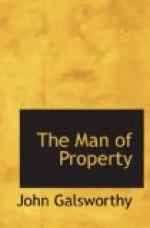It was a fine afternoon, and he walked across the Park towards Soames’s, where he intended to dine, for Emily’s toe kept her in bed, and Rachel and Cicely were on a visit to the country. He took the slanting path from the Bayswater side of the Row to the Knightsbridge Gate, across a pasture of short, burnt grass, dotted with blackened sheep, strewn with seated couples and strange waifs; lying prone on their faces, like corpses on a field over which the wave of battle has rolled.
He walked rapidly, his head bent, looking neither to right nor, left. The appearance of this park, the centre of his own battle-field, where he had all his life been fighting, excited no thought or speculation in his mind. These corpses flung down, there, from out the press and turmoil of the struggle, these pairs of lovers sitting cheek by jowl for an hour of idle Elysium snatched from the monotony of their treadmill, awakened no fancies in his mind; he had outlived that kind of imagination; his nose, like the nose of a sheep, was fastened to the pastures on which he browsed.
One of his tenants had lately shown a disposition to be behind-hand in his rent, and it had become a grave question whether he had not better turn him out at once, and so run the risk of not re-letting before Christmas. Swithin had just been let in very badly, but it had served him right—he had held on too long.
He pondered this as he walked steadily, holding his umbrella carefully by the wood, just below the crook of the handle, so as to keep the ferule off the ground, and not fray the silk in the middle. And, with his thin, high shoulders stooped, his long legs moving with swift mechanical precision, this passage through the Park, where the sun shone with a clear flame on so much idleness—on so many human evidences of the remorseless battle of Property, raging beyond its ring—was like the flight of some land bird across the sea.
He felt a—touch on the arm as he came out at Albert Gate.
It was Soames, who, crossing from the shady side of Piccadilly, where he had been walking home from the office, had suddenly appeared alongside.
“Your mother’s in bed,” said James; “I was, just coming to you, but I suppose I shall be in the way.”
The outward relations between James and his son were marked by a lack of sentiment peculiarly Forsytean, but for all that the two were by no means unattached. Perhaps they regarded one another as an investment; certainly they were solicitous of each other’s welfare, glad of each other’s company. They had never exchanged two words upon the more intimate problems of life, or revealed in each other’s presence the existence of any deep feeling.
Something beyond the power of word-analysis bound them together, something hidden deep in the fibre of nations and families—for blood, they say, is thicker than water—and neither of them was a cold-blooded man. Indeed, in James love of his children was now the prime motive of his existence. To have creatures who were parts of himself, to whom he might transmit the money he saved, was at the root of his saving; and, at seventy-five, what was left that could give him pleasure, but—saving? The kernel of life was in this saving for his children.




